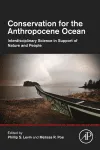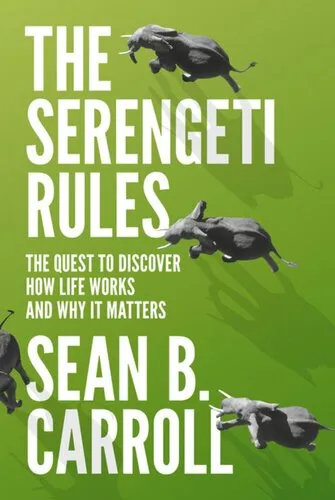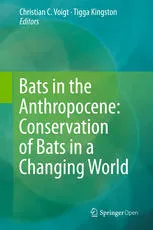Conservation for the Anthropocene Ocean. Interdisciplinary Science in Support of Nature and People
4.5
بر اساس نظر کاربران

شما میتونید سوالاتتون در باره کتاب رو از هوش مصنوعیش بعد از ورود بپرسید
هر دانلود یا پرسش از هوش مصنوعی 2 امتیاز لازم دارد، برای بدست آوردن امتیاز رایگان، به صفحه ی راهنمای امتیازات سر بزنید و یک سری کار ارزشمند انجام بدینکتاب های مرتبط:
معرفی کتاب: Conservation for the Anthropocene Ocean
کتاب Conservation for the Anthropocene Ocean: Interdisciplinary Science in Support of Nature and People نوشتهی Phillip Levin و Melissa R. Poe، یکی از برجستهترین آثار در زمینهی حفاظت از دریاها و اقیانوسها در عصر انسانمحور (Anthropocene) است. این کتاب با ارائهی بینشی چندرشتهای، نگاه تازهای به چالشها و فرصتهای حفظ اکوسیستمهای اقیانوسی در دورهی فعلی دارد. نویسندگان تلاش کردهاند از ابزارهای علمی، اجتماعی و فرهنگی بهرهبرداری کنند تا تعادل میان طبیعت و انسان، در سیاستها و تصمیمگیریهای مرتبط با اقیانوسها برقرار شود.
خلاصهای از کتاب
در این کتاب، نویسندگان توضیح میدهند که چگونه فعالیتهای انسانی، نظیر تغییرات اقلیمی، آلودگی، ماهیگیری بیشازحد و از بین رفتن تنوع زیستی، بر سلامت اقیانوسها تأثیر میگذارند. آنها این مسائل را از دیدگاههای مختلف علمی و اجتماعی مورد بررسی قرار میدهند. نویسندگان تاکید میکنند که برای اجرای سیاستهای مؤثر، نه تنها نیازمند دادههای زیستمحیطی معتبر هستیم، بلکه درک پویاییهای اجتماعی و اقتصادی مرتبط نیز ضروری است.
این اثر، ضمن حرکت از دیدگاههای سنتی حفاظت، به ضرورت تغییر نگرش به سمت مدلهای مشارکتی و جامع اشاره دارد. این مدلها بر تعامل میان دانش بومی، دانشمندان، تصمیمگیران و جوامع محلی تاکید دارند. نویسندگان همچنین به بحث دربارهی ایدههای نوین نظیر Nature-Based Solutions و Market-Based Conservation پرداخته و ارزش چنین رویکردهایی را در دنیای مدرن مورد تاکید قرار میدهند.
نکات کلیدی
- تاکید بر استفاده از رویکردهای بینرشتهای برای درک و محافظت از اقیانوسها.
- ارائهی شواهد علمی جدید درباره وضعیت اقیانوسها در عصر Anthropocene.
- پیشنهاداتی عملی برای ادغام منافع انسانی و طبیعت در سیاستهای اقیانوسی.
- برجسته کردن نیاز به مشارکت جوامع محلی در فرآیندهای مدیریتی.
- بحث در مورد محدودیتهای روشهای سنتی حفاظت و معرفی مدلهای جدید سازگار با چالشهای امروز.
جملات معروف کتاب
"To conserve our oceans, we must bridge the gap between human well-being and ecological health."
"Solutions that work in the Anthropocene require us to go beyond science alone – we must incorporate culture, values, and priorities of the people."
چرا این کتاب اهمیت دارد؟
اقیانوسها یکی از مهمترین منابع طبیعی ما هستند که نقش قابلتوجهی در تنظیم اقلیم جهانی ایفا میکنند، فراهمکننده منابع غذاییاند و اکوسیستمهای متنوعی را دربرمیگیرند. با این حال، فعالیتهای انسانی تهدیدهای بسیاری را برای اقیانوسها به همراه داشته است. کتاب Conservation for the Anthropocene Ocean بهعنوان یک راهنمای جامع، ابزاری ضروری برای سیاستگذاران، دانشمندان، فعالان محیطزیست، و دیگر علاقمندان به حفظ اقیانوسهاست. نویسندگان، فراتر از اصول تئوری، راهحلهای عملی و الهامبخشی ارائه میدهند که میتواند به تنظیم مسیرهای جدیدی برای حفاظت از طبیعت و تعامل مؤثر با مردم منجر شود.
اگرچه اغلب آثار مرتبط با محیطزیست بر علوم زیستی متمرکز هستند، این کتاب با دیدگاهی جامعتر، بر اهمیت علوم اجتماعی در کنار علوم زیستمحیطی تأکید دارد. این ویژگی نهتنها آن را به یک منبع آموزشی منحصربهفرد تبدیل میکند، بلکه درک عمیقتری از دلایل ریشهای مسائل زیستمحیطی ارائه میدهد.
Introduction to "Conservation for the Anthropocene Ocean: Interdisciplinary Science in Support of Nature and People"
The Anthropocene—the current geological epoch characterized by significant human impact on Earth's ecosystems—is a defining moment for the health of our planet's oceans. As the complex interplay between nature and society shapes marine environments, effective conservation strategies must integrate interdisciplinary approaches to address this challenge. Conservation for the Anthropocene Ocean: Interdisciplinary Science in Support of Nature and People is a groundbreaking work that explores the critical intersections of science, policy, and human well-being in safeguarding our oceans. Edited by Phillip Levin and Melissa R. Poe, this book assembles a wealth of diverse perspectives from experts across multiple fields, offering innovative solutions grounded in actionable science.
The publication aims to reimagine traditional conservation practices by emphasizing the importance of considering both ecological and sociocultural dimensions. By balancing the interests of marine ecosystems with the needs and aspirations of human communities, this book provides an inclusive framework for decision-makers and practitioners who seek sustainable outcomes for the oceans. Here, you'll find not only a comprehensive overview of oceanic challenges but also a call for collaboration and adaptive management strategies to confront the ever-evolving problems of the Anthropocene era.
Detailed Summary of the Book
Conservation for the Anthropocene Ocean spans several topics critical to modern ocean conservation. The book delves into the myriad pressures faced by marine ecosystems, including climate change, overfishing, pollution, habitat destruction, and the socio-economic dynamics driving these issues. It emphasizes the importance of solutions that prioritize more than just biodiversity; solutions must also address human livelihoods, cultural values, and equity among communities affected by conservation policies.
The editors have organized the book into sections that integrate ecological science, social science, and policy analysis. Contributors provide case studies from around the world, highlighting successful conservation initiatives and the challenges encountered along the way. The central theme revolves around embracing complexity—acknowledging that marine conservation is not a one-size-fits-all endeavor but rather a process that requires localized solutions informed by global knowledge.
Additionally, the book introduces cutting-edge tools and methodologies, from co-designing conservation policies with stakeholders to leveraging big data for ecosystem monitoring. These insights pave the way for an inclusive, adaptive, and collaborative approach to marine conservation.
Key Takeaways
- Modern conservation must address both ecological and human dimensions to be successful.
- Interdisciplinary collaboration is essential for tackling the complex challenges of the Anthropocene.
- Adaptive management allows conservation efforts to respond dynamically to emerging data and changing conditions.
- Case studies provide valuable lessons about what works and what doesn’t in real-world conservation contexts.
- Sustainable conservation requires inclusive decision-making processes that respect the rights and voices of all stakeholders, including marginalized populations.
Famous Quotes from the Book
"Conservation is no longer about wilderness alone; it is about the spaces where human activity and the natural world collide." - Phillip Levin
"By recognizing the interconnectedness of people and the ocean, we can design solutions that are not just beneficial for ecosystems but also sustainable for communities." - Melissa R. Poe
"The Anthropocene compels us to view conservation through a different lens—one that bridges science, policy, and society for a healthier, more resilient ocean." - Contributing Author
Why This Book Matters
The ocean is the lifeblood of our planet. It regulates the climate, provides food for billions, and supports countless species. Yet, human activities have placed unprecedented stress on marine systems. This book matters because it redefines how we approach conservation in this critical era. It advocates for a holistic perspective, where science meets people, and solutions are designed to be equitable and enduring.
Its interdisciplinary focus ensures that no single perspective dominates the conversation, creating a platform where scientists, policymakers, activists, and local communities can come together. By adopting this comprehensive approach, Conservation for the Anthropocene Ocean is not just a reference for researchers and practitioners; it's a manifesto for anyone who cares deeply about the future of our planet's oceans and the people who depend on them.
As the challenges of the Anthropocene continue to grow, this book serves as both a guide and an inspiration. It presents a vision of hope—a future where human ingenuity and collaboration can forge a path toward sustainable coexistence with our ocean ecosystems.
دانلود رایگان مستقیم
شما میتونید سوالاتتون در باره کتاب رو از هوش مصنوعیش بعد از ورود بپرسید
دسترسی به کتابها از طریق پلتفرمهای قانونی و کتابخانههای عمومی نه تنها از حقوق نویسندگان و ناشران حمایت میکند، بلکه به پایداری فرهنگ کتابخوانی نیز کمک میرساند. پیش از دانلود، لحظهای به بررسی این گزینهها فکر کنید.
این کتاب رو در پلتفرم های دیگه ببینید
WorldCat به شما کمک میکنه تا کتاب ها رو در کتابخانه های سراسر دنیا پیدا کنید
امتیازها، نظرات تخصصی و صحبت ها درباره کتاب را در Goodreads ببینید
کتابهای کمیاب یا دست دوم را در AbeBooks پیدا کنید و بخرید
1361
بازدید4.5
امتیاز0
نظر98%
رضایتنظرات:
4.5
بر اساس 0 نظر کاربران
Questions & Answers
Ask questions about this book or help others by answering
No questions yet. Be the first to ask!













